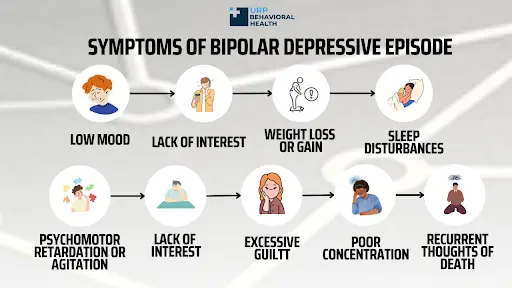
Bipolar disorder is a mental illness, formally called ‘Manic Depressive illness’. This disorder affects a person’s energy level and mood, which causes unusual shifts in human temperament.
Bipolar disorder includes two types of intense emotional states:
- Mania or Hypomania ( High Emotional state)
- Depression (Low Emotional State)
During these depressive phases, people often feel sadness, hopelessness, and a lack of interest or pleasure in daily activities. When changes go to mania or hypomania, they might experience euphoria, heightened energy, or increased irritability. This type of emotional instability significantly impacts sleep, energy levels, daily activities, decision-making, behavior, and cognitive system.
Although bipolar disorder remains with people throughout life; however, it is not impossible to defeat this disorder by controlling mood swings and related symptoms through a proper treatment plan. Typically, medications and psychotherapy are considered best for bipolar disorder treatment.
Major Causes of Bipolar Disorder

There is a lack of clear insight into why certain individuals have bipolar disorder. However, experts considered both genetic factors and life experiences contribute to its occurrence.
If someone in your family like your parents, or siblings has bipolar disorder, there is a high chance that you will also be affected by this disorder at some point in your life. The risk stands at around 13 in 100 if the patient is your close family member.
External factors that also contribute to this disorder, such as stressful incidents, can become the major cause of bipolar disorder.
These stressors contain various challenges like relationship issues, bad experiences, the loss of a loved one, physical disorders, job-related difficulties, sleep disturbances, financial problems, and other stressors.
Symptoms

Symptoms of bipolar disorder can significantly influence everyday life and affect relationships and work. Here are different symptom categories:
| Mania or Hypomania | Depression |
| Adopting unexpected or risky behaviors. | Lack of interest in daily life activities. |
| Overconfidence leads to impractical decisions. | Changes occur in eating habits which lead to weight loss or weight gain |
| Sleeping disorders. | Restlessness |
| Lack of concentration. | Trouble in decision-making |
| High-level irritability. | Constant low mood. |
| Developing numerous innovative ideas rapidly. | Trouble in concentrating, remembering, or making decisions. |
| Feeling excessively happy or excited. | Decreased energy and increased tiredness |
| High self-esteem. | Lack of sleep |
| Experiencing running thoughts and speaking rapidly. | Feelings of hopelessness, negativity, guilt, or worthlessness. |
| Noticing voices that are unheard by others. | Thoughts of Suicide |
Major Effects of Bipolar Disorder on Daily Life

Bipolar disorder affects many areas of life. The major ones are mentioned below:
- It involves extreme mood swings between manic and depressive episodes, The unpredictable changes can affect daily routines.
- Maintaining persistent productivity at work becomes a challenge for people with bipolar disorder.
- An individual might excitedly start some activity during a manic phase but lose interest suddenly during a depressive episode. It influences their sense of satisfaction and provokes negative thoughts in their minds.
- Extreme changes occur in the sleeping habits of the patients.
- Mood swings often influence eating behaviors.
- The instability can make it challenging for friends and loved ones to understand these mood changes which affect the stability of relationships.
Treatment

Bipolar disorder is a chronic disorder that needs proactive management.
While initially, the person can feel loneliness. Diagnosis of the disorder at its earliest is the first and the most crucial step towards proper treatment. Effective treatment, associated with support and self-care, helps individuals with bipolar disorder to lead healthy, fulfilling lives.
If you feel any of the above symptoms in your behavior consult a mental health professional. A proper medical checkup is an essential step before further processing.
Treatment for bipolar disorder generally includes a blend of medication and therapy:
Medication

Mood stabilizers, antipsychotics, and antidepressants are used to manage mood swings and other symptoms. Medication holds both benefits and side effects. It may take some time to find the most effective one from various medications. So, it’s essential never to stop medication without a doctor’s guidance.
Psychotherapy
Starting therapy helps in accepting the condition. It also helps to identify warning signs of mood phases. It also develops proper coping processes for stress, encourages to stick with the medication schedules, and improves communication within families.

Long-term and consistent treatment consequently minimizes the intensity and frequency of mood swings. Eventually, a time comes when symptoms seem absent.
Adopting a Healthy Lifestyle
Besides professional treatment, maintaining a healthy lifestyle proves beneficial in controlling bipolar disorder. Here are some tips for a healthy lifestyle:
- Take proper sleep, as disrupted sleep routines can activate bipolar symptoms.
- Adopt a balanced diet and engage in regular exercise, it will not only provide proper nutrition but also positively impact mood.
- Strictly keep yourself bound to prescribed medication, even during normal conditions, it is essential to defeat the disorder.

- Always consult with your doctor before taking any non-prescribed medication.
- Keeping immediate care physicians updated on bipolar disorder management, alongside psychiatric consultations, provides comprehensive care.
- Avoid using alcohol, as it can aggravate symptoms.
- Reducing stress through simplifying life and engaging in relaxation strategies like meditation or yoga is helpful.
- Maintaining a strong support system of educated family and friends helps identify warning signs and provide help during challenging times.




